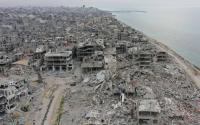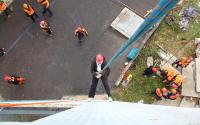20 June 2004
Who could catalogue the lies of our times? In fact, the category "lies" hardly covers the matter. Take a simple example, just now on front pages everywhere: the President invites the press in for a post-cabinet-meeting moment. It's the day after the 9/11 Commission staff has delivered a total no-brainer revelation: Months of research, the questioning of experts and intelligence insiders, not to speak of the reading of the interrogation transcripts of top al-Qaeda figures and Iraqi officials all reveal -- gasp -- that there was no "collaboration," no significant connection between Saddam Hussein and al-Qaeda, just as there were no weapons of mass destruction or mobile biological labs, just as there was no Niger yellowcake deal, just as, the Los Angeles Times reports, U.S. intelligence repeatedly "confused" Iraqi chicken coops with Scud missile sites, just as … oh well.
The President promptly responded to the 9/11 Commission news thusly:
"The reason I keep insisting that there was a relationship between Iraq and Saddam and al Qaeda, because there was a relationship between Iraq and al Qaeda. This administration never said that the 9/11 attacks were orchestrated between Saddam and al Qaeda. We did say there were numerous contacts between Saddam Hussein and al Qaeda."
Jim Lobe of Inter Press Service comments:
"This is what logicians call a tautology, or a ‘useless repetition,' as the dictionary defines it, but it is also an indication of how the Bush administration is defending itself against a growing number of scandals and deceptions in which it finds itself enmeshed. Repetition and blaming the media, an old standby, of which Vice President Dick Cheney and Pentagon chief Donald Rumsfeld are particularly fond dating back to their service under Presidents Richard Nixon and Gerald Ford 30 years ago, are back in vogue."
Now, admittedly, the President's use of the word "relationship" calls to mind the "meaning of is" parsings of his predecessor (though on far lesser matters of state). Who knows, after all, what this President thinks a relationship is? Certainly, to take but one example, by such standards the pre-Afghan-war relationship between the Bush administration and the Taliban would have to qualify as a deep friendship. Or, as the editor of the War in Context website puts the matter, "George Bush and John Kerry have a relationship: They are both candidates in the coming presidential election. Assuming that they participate in a debate or two, this will require some level of cooperation. Does this mean that Bush supports the Kerry campaign?"
But what of the other part of the President's statement? Did the "administration" ever say that the 9/11 attacks were "orchestrated between Saddam and al Qaeda?"
Well, just to quote a single Presidential "is" on the subject. Mimi Hall of USA Today notes: "In a letter to Congress on March 19, 2003 -- the day the war in Iraq began -- Bush said that the war was permitted under legislation authorizing force against those who 'planned, authorized, committed, or aided the terrorist attacks that occurred on September 11, 2001.'"
And, of course, even when he didn't literally say so -- and Fred Kaplan of Slate points out that the President was generally quite precise in the imprecision of his words -- he constantly associated the two (as did the rest of his crew) even on the rare occasions when he seemed to admit that Saddam had nothing to do with 9/11. In last year's State of the Union speech, for instance, with war looming he said: "Imagine those 19 hijackers with other weapons and other plans -- this time armed by Saddam."
His vice president is another matter, however. Unless, of course, you don't consider Dick Cheney part of the "administration," you might have to deal with quotes like this:
"In September, Cheney said on NBC's ‘Meet the Press': ‘If we're successful in Iraq . . . then we will have struck a major blow right at the heart of the base, if you will, the geographic base of the terrorists who had us under assault now for many years, but most especially on 9/11.'"
By the way, it turns out the President didn't offer his "spontaneous" responses at that post-cabinet-meeting press session in a completely "spontaneous" manner. He had a crib sheet, caught by happenstance in an AP photo, swiveled and blown up thanks to the wonders of modern technology and posted at a blog. According to Dan Froomkin's invaluable White House Briefing column at the Washington Post, it said:
"Saddam Was A Threat --"Sworn Enemy of US…"Destabilizing Force…"Volatile part of world…"Had Weapons of Mass D . . ."Tied to terrorist orgs . . ."
Ho-hum. Same old, same old. Was was and is is. Oh, and just in case our President froze in that moment of spontaneous interchange while wondering exactly whom to call on to create that same same-old, same-old effect, he just happened to have a well-ordered list of reporters on that crib sheet, the first two of whom he called on before ending the session. If you want to check out the al-Qaeda-ties case yet again, go to the Center for American Progress website. But, of course, on these ties, on WMD, on the effects of tax cuts, and on so many other subjects, you could go through this exercise of evidence and refutation until you were blue in the face and it might not matter at all. No matter what arguments are made, this administration just -- to use Lobe's word -- brazenly reasserts what, in any other context, would seem to be obvious lies.
Each stunning refutation by someone who was there -- David Kay on WMD; Terrorism Tsar Richard Clarke on the origins of the Iraq war, former Treasury Secretary Paul O'Neill on the administration's pre-9/11 lack of interest in al-Qaeda -- and you think another lie has just crashed and burned. And yet, and yet…
In my just-launched series of unnoticed-resemblances between the Bush and Reagan eras, let me note that our former President pioneered this method of asserting the reality he chose and then insistently reasserting it against all evidence. His Strategic Defense Initiative, a supposed missile defense system against massive nuclear attack, was perhaps the classic example of this. It was always a "high frontier" corporate boondoggle. But when its critics, who knew perfectly well that it wouldn't fly, mockingly labeled it "Star Wars," the President simply absorbed the term, adding charmingly, "The force is with us." As the nation's top weapons scientists and experts at MIT and elsewhere shot down one Star-Wars plan after another, the system simply morphed into new forms and the President reasserted his "vision." And so it went. While Star Wars never made into the heavens, the moneys for versions of it flowed, and continue to flow, into corporate defense coffers. What Reagan showed was that this kind of a rope-a-dope response worked and it's still in use.
In fact, in extremely aggressive form, it's become the essence of this administration and has even recently gained pseudo-legal underpinnings. The legal memos on torture it sponsored essentially assert that reality is what the President, as commander-in-chief, insists it is, and neither Congress, nor the courts can interfere with his redefinition of reality as long as it happens in "wartime" -- itself not even declared by Congress but defined as such by the President. As with the constant reassertions of al-Qaeda/Saddam ties, this administration simply insistes that reality be made to conform to its needs and that it will broach no interlopers in the process.
This obviously goes far beyond the matter of lies (where so many in opposition to this administration are stuck). It is an assertion about the nature of reality: The world is what we say it is and language is no object. As with all ruling groups, self-indoctrination undoubtedly plays a powerful role here. These inside-the-Beltway warriors have surely convinced themselves of the truths that lie at the heart of their self-proclaimed "war on terror." It's likely that few of them believe themselves to be lying on essential matters (though they may be perfectly aware that aspects of what they are saying represent "necessary" or tactical lies).
Add in another factor here, foregrounded once again by the 9/11 Commission's recent staff report: As the World Trade Center was attacked, the President froze for seven excruciating on-camera minutes in a classroom at the Emma T. Booker elementary school in Florida. He continued to sit and listen to children read as events unfolded. (All seven minutes will be on view in Michael Moore's new film, Fahrenheit 9/11, scheduled to open next week.) The President and his advisers then panicked amid the chaos and sent his plane on a wild series of hops west rather than north.
Now, the fact is you never know how you'll react in a stressful situation. Anyone can freeze. But the President's reaction had to be personally humiliating. I've always believed that it gave a special oomph to all the macho play-acting that followed ("Dead or alive," "Mission accomplished," "Bring ‘em on!"). Much of it is, I suspect, compensatory. I'm willing to bet those seven minutes -- which in the long run won't be forgotten -- continue to gnaw at George W. Bush and helped drive him personally into his war "mission" and then beyond all bounds.
The 9/11 Commission chairmen have now requested from the vice president in particular "any intelligence reports that would support the White House's insistence that there was a close relationship between Saddam Hussein and Al Qaeda"; though Juan Cole comments, "Cheney as much as admitted that he gets his news on these things from the National Review, a rightwing magazine that is not known for having real experts on the Arab world, the sort who know Arabic and have lived there, on the staff."
However the administration tries to duck this one, one thing is certain: All refutations of administration positions will be followed by administration reiterations of one sort or another. There is no question that the Bush administration has shown itself willing to go far indeed to make reality conform to its needs and has until recently been remarkably successful in doing so. Even now, with the media floodgates finally opening at least part way, much that is being reported doesn't sink in. You would think, for instance, that a close relationship with the head of an organization which once set off car bombs in downtown Baghdad, a man whom we just elevated to prime minister of Iraq, might affect the reputation of a war-on-terror administration; but this revelation -- on the front-page of the New York Times, no less -- seems to have had no impact whatsoever.
Last week it was revealed that Donald Rumsfeld had ordered that an Iraqi prisoner held for months as a "ghost detainee," and this caused a modest media rumpus. This detention, however, is but a snowflake on the tip of our detention iceberg. Instead of single ghost detainees -- Human Rights Watch has identified at least 13 of these -- we have whole ghost interrogation centers. As Reuters reported this week: "The United States is holding terrorism suspects in more than two dozen detention centers worldwide and about half of these operate in total secrecy, said a human rights report released on Thursday." These detention centers range from Jordan to Pakistan, the island of Diego Garcia to aircraft carrier brigs. (The Human Rights First report, the most far-reaching account yet of our offshore mini-gulag, can be read by clicking here [warning: pdf file].)
So information is suddenly pouring out and the administration seems at the edge of imploding, but the question is: Will it make a difference or will the assertion of a different reality simply trump all else?
Let me end this disquisition with a fable from the fabulous pen of James Thurber. To my surprise, Thurber, though long dead, seems somehow to have channeled our moment. I've not seen this fable, which I recall from my childhood (and which appears in his 1940 book Fables of Our Time), quoted before in this context. It's entitled "The Birds and the Foxes" and reads in full:
"Once upon a time there was a bird sanctuary in which hundreds of Baltimore orioles lived together happily. The refuge consisted of a forest entirely surrounded by a high wire fence. When it was put up, a pack of foxes who lived nearby protested that it was an arbitrary and unnatural boundary. However, they did nothing about it at the time because they were interested in civilizing the geese and ducks on the neighboring farms. When all the geese and ducks had been civilized, and there was nothing left to eat, the foxes once more turned their attention to the bird sanctuary. Their leader announced that there had once been foxes in the sanctuary but that they had been driven out. He proclaimed that Baltimore orioles belonged in Baltimore. He said, furthermore, that the orioles in the sanctuary were a continuous menace to the peace in the world. The other animals cautioned the foxes not to disturb the birds in their sanctuary.
"So the foxes attacked the sanctuary one night and tore down the fence that surrounded it. The orioles rushed out and were instantly killed and eaten by the foxes.
"The next day the leader of the foxes, a fox from whom God was receiving daily guidance, got upon the rostrum and addressed the other foxes. His message was simple and sublime. ‘You see before you," he said, "another Lincoln. We have liberated all those birds!'
"Moral: Government of the orioles, by the foxes, and for the foxes, must perish from the earth."
Now, let me turn from the world-devastating and significant to the waist-expanding and insignificant. and offer a tiny reminder that this administration and its various supporters are bending reality at every level to meet their needs.
The battered French fry
In the run up to war in Iraq, when the French opposed us, or rather when the Bush administration left the French no leeway whatsoever to clamber aboard their moving armada of tanks and missiles, the lowly but beloved French fry (known "over there" as a pomme frite) took a pounding as well. While our tabloid press declared the French to be "weasels," or part of an "Axis of Weasels," and the New York Post infamously superimposed weasel heads on a photo of French and German UN diplomats, our congressional representatives bravely went nuts, exhibiting what passes for "patriotism" by renaming French fries, "freedom fries," in various of their cafeterias. "This action today is a small, but symbolic effort to show the strong displeasure of many on Capitol Hill with the actions of our so-called ally, France," Republican congressman Bob Ney of Ohio announced at the time. He was the chairman of the Committee on House Administration which held in trust the weighty burden of congressional fry oversight. (Never shirking the brave gesture, the White House gave the nod to the relabeling of French toast on the presidential plane, Air Force One. "Stuffed freedom toast" was, reported CNN, "a subtle slap at the French for helping to confound U.S. attempts to get the U.N. Security Council to authorize military force against Iraq… White House spokesman Ari Fleischer, asked about the newly titled ‘Freedom toast,' smiled and said, ‘We're always proud of the men and women of our Air Force.'" In congressional cafeterias, the humble fry is to this day shorn of its proud Gallic heritage and continues to be served under its nom de guerre.
Lately, our President, watching his Iraq policy drop off a cliff, has moved to patch up relations with France, inviting Jacques Chirac to drop by the "ranch" in Crawford, Texas someday to see his toy cows and then bantering with him at Sea Island during the G-8 conference about cheeseburgers. It seems, however, that our own Agriculture Department foresaw this moment. In 2000, unbeknownst to anyone but the French-fry lobby (yes, Virginia, there is a French-fry lobby), it began upgrading one species of that humble edible, the much-battered, frozen fry. In that year, as Andrew Martin of the Chicago Tribune explains:
"The Frozen Potato Products Institute appealed to the USDA… to change its definition of fresh produce under PACA to include batter-coated, frozen French fries, arguing that rolling potato slices in a starch coating, frying them and freezing them is the equivalent of waxing a cucumber or sweetening a strawberry. The USDA agreed and, on June 2, 2003, the agency amended its PACA rules to include what is described in court documents as the ‘Batter-Coating Rule.'"
PACA, by the way, was a law passed in the 1930s by Congress to protect fruit and vegetable farmers from being stiffed by deadbeat buyers. Recently, this hardly noticed Bush administration rule-change was challenged in a Texas court by a bankrupt frozen-fry company which didn't want to pay creditors in full (as would have been necessary if the battered frozen fry were truly a fresh vegetable). U.S. Department of Agriculture lawyers fought back manfully. "While plaintiff argued that battered-coated French fries are processed products," they claimed, "they have not been 'processed' to the point that they are no longer 'fresh'…It is still considered 'fresh' because it is not preserved. It retains its perishable quality."
And, this being Texas, the judge agreed, ruling that the already battered and freezing fry should go to its death as a fresh vegetable. "U.S. District Judge Richard Schell said the term ‘fresh vegetables' was ambiguous." In this, though he probably didn't know it, he was following an already well-beaten administration path. On rulings of far greater import, administration lawyers had privately advised the administration that words like "severe" or "profound" in definitions of torture were also ambiguous and so open to severe and profound redefinition in the service of the war-on-terrorism needs of top Bush officials.
As part of an attempted wholesale redefinition of reality, the modest redefinition of the frozen, battered fry isn't even on a par with administration attempts to reclassify "fast food employment as a manufacturing job," as first reported in the New York Times many months ago. (No offshore loss of manufacturing jobs under this administration, no sirree; just a lot of hardworking factory hands tossing previously frozen, heavily battered fresh vegetables for minimal wages at fast-food factories.)
As long as we've embarked on a path of redefining and renaming reality, and the courts are willing to back it up, I have a small suggestion for furthering the process and helping out an industry which certainly has at least as much to lose as the frozen-fry business and is far more deeply embedded in the Bush administration's Agriculture Department. What about reclassifying beef? After all, most cows, raised in huge feedlots, no longer eat grass. They are now essentially vessels for American-grown corn (making this suggestion especially patriotic). So, if you first reimagine a cow as a corn vessel, then beef too could be relabeled as a "fresh vegetable" (though some might say, based on the level of drugs feedlot cattle are given, that it's actually a "fresh chemical"). Imagine the advantages of this for the beef industry. The next time a case of mad-cow disease is discovered, it will have to be relabeled "mad vegetable disease," taking enormous pressure off the business and off the need to do any further or more thorough testing of cattle.
All of this is obviously possible since, as Judge Schell ruled, the term "fresh vegetables" is an ambiguous one. Of course, for cows meant for the high-end market that are grass-fed and allowed to wander, it certainly wouldn't be much of a stretch to create a new category (invented by a friend): free-range vegetables.
By the way, here's another of those little similarities between the Bush and Reagan eras. In Reagan's first term, that kindly man tried to reach out a helping redefinitional hand to schools that, as the Washington Post reported in September 1981, "provide free or reduced-price lunches to lower-income students as they try to deal with a $1 billion cut in federal support for the fiscal year." The modest answer then was, in part, to create a cheaper lunch package under federal nutritional guidelines by reclassifying ketchup and relish as vegetables. As an aide to Agriculture Secretary John Block summarized it at the time, "'There was a great misunderstanding in the land as to how these regulations are viewed. I think it would be a mistake to say that ketchup per se was classified as a vegetable . . . Ketchup in combination with other things was classified as a vegetable.' What other things? he was asked. ‘French fries or hamburgers,' he replied."
Plus ça change. The only difference being that the Reagan administration, when faced with recalcitrant reality, as in the case of ketchup, sometimes backed down. The Bush administration just reasserts its reality and calls on the lawyers for confirmation.






